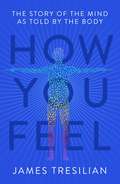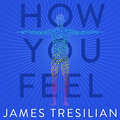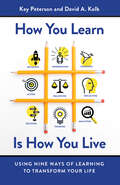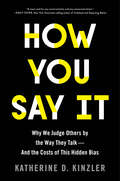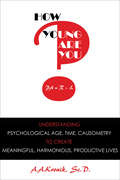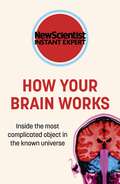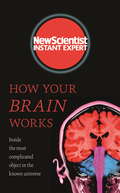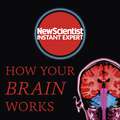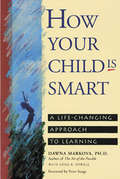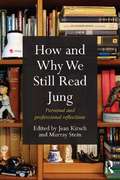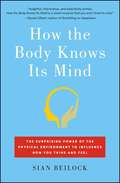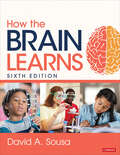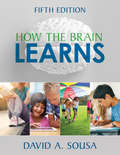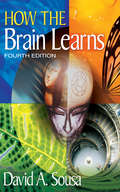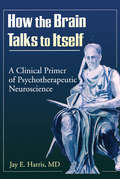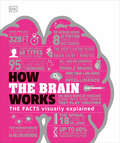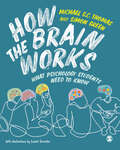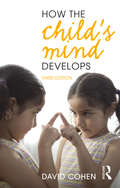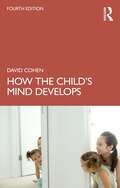- Table View
- List View
How You Feel: The Story of the Mind as Told by the Body
by James TresilianClose your eyes and ask yourself, ''what do I feel?''You might feel thirsty or tired. You might feel healthy and well or perhaps a little under the weather. Maybe you can feel that you are standing or that you are leaning over. You may also feel the world around you - the shape and texture of an apple in your hand, the feel of a chair you''re sitting on.All these feelings have something in common, say psychologists and neuroscientists. They are all mental events, things that happen in the mind. But what if this is all wrong?What if it''s not just the mind, but also the body itself that feels? And not merely physical sensations, but other feelings that seem to have nothing to do with bodies. Things like ''emotions'' and ''intuitions'' - joy or rage, anxiety or optimism, or the feeling of being hard done by or misunderstood?Drawing on the latest research and a range of classic and contemporary thought, How You Feel shows you that your brain and your body are two parts of a single system that creates your mind and mental life. You will discover that you don''t have feelings, thoughts and emotions inside your body, you have them with your body. There can be no mind without the body.Psychology is no longer about the brain, or about ''mind and body'', it is about the whole that is you.
How You Feel: The Story of the Mind as Told by the Body
by James TresilianClose your eyes and ask yourself, 'what do I feel?'You might feel thirsty or tired. You might feel healthy and well or perhaps a little under the weather. Maybe you can feel that you are standing or that you are leaning over. You may also feel the world around you - the shape and texture of an apple in your hand, the feel of a chair you're sitting on.All these feelings have something in common, say psychologists and neuroscientists. They are all mental events, things that happen in the mind. But what if this is all wrong?What if it's not just the mind, but also the body itself that feels? And not merely physical sensations, but other feelings that seem to have nothing to do with bodies. Things like 'emotions' and 'intuitions' - joy or rage, anxiety or optimism, or the feeling of being hard done by or misunderstood?Drawing on the latest research and a range of classic and contemporary thought, How You Feel shows you that your brain and your body are two parts of a single system that creates your mind and mental life. You will discover that you don't have feelings, thoughts and emotions inside your body, you have them with your body. There can be no mind without the body.Psychology is no longer about the brain, or about 'mind and body', it is about the whole that is you.
How You Learn Is How You Live: Using Nine Ways of Learning to Transform Your Life
by David A. Kolb Kay PetersonWhat's Your Learning Style?Being a lifelong learner is one of the secrets to happiness, success, and personal fulfillment. But what's the best way to become one? Kay Peterson and David Kolb have the answer. They offer deep, research-based insights into the ideal process of learning and guide you in identifying your dominant style. You'll discover how knowing your learning style can help you with all kinds of everyday challenges, from remembering someone's name to adding a crucial professional skill to your repertoire. This book is a guide to awakening the power of learning that lies within each of us.
How You Say It: Why We Judge Others by the Way They Talk—and the Costs of This Hidden Bias
by Katherine D. KinzlerFrom &“one of the most brilliant young psychologists of her generation&” (Paul Bloom), a groundbreaking examination of how speech causes some of our deepest social divides—and how it can help us overcome them We gravitate toward people like us; it&’s human nature. Race, class, and gender shape our social identities, and thus who we perceive as &“like us&” or &“not like us.&” But one overlooked factor can be even more powerful: the way we speak. As the pioneering psychologist Katherine Kinzler reveals in How You Say It, the way we talk is central to our social identity because our speech largely reflects the voices we heard as children. We can change how we speak to some extent, whether by &“code-switching&” between dialects or by learning a new language; over time, our speech even changes to reflect our evolving social identity and aspirations. But for the most part, we are forever marked by our native tongue—and are hardwired to prejudge others by theirs, often with serious consequences. Someone&’s accent alone can determine the economic opportunity or discrimination they encounter in life, making speech one of the most urgent social-justice issues of our day. Our linguistic differences present challenges, Kinzler shows, but they also can be a force for good. Humans can benefit from being exposed to multiple languages—a paradox that should inspire us to master this ancient source of tribalism and rethink the role that speech plays in our society.
How Young Are You?: Understanding Psychological Age, Time, Causometry, to Create Meaningful, Harmonious, Productive Lives
by A. A Kronik“His work is truly revolutionary. He has taken the most important of existential experiences and made them transparent for self-growth and research.” —Linda Berg-Cross, PhD, ABPP, Professor of Psychology, Howard UniversityThe main purpose of this research-based, self-help book is to introduce the goal-and-causal theory of “Psychological Time,” and to help you calculate your “Psychological Age”—that is, how old you feel, based on significant events in your life. You can also learn how to lower your psychological age (feel younger), using past experiences to move into the future, rejuvenating the mind for more satisfying personal growth, productivity, and happiness. We humans created the convention of Time—hours, days, millennia. But we also created “Psychological Time,” which we can compress (to survive an interminable wait, for example), or expand (to luxuriate in pleasure). So fully-integrated into our brain is this “Psychological Time” that, as part of the illusion, we can lose touch with “real” chronological time altogether, and even change the sequence of past events to contradict or override our otherwise communal understanding of the world. In this book, you will generate “Causograms,” a kind of map that graphically represents your perception of the cause-and-effect and goal-based connections that your mind naturally makes between life experiences. These include, but are not limited to achievements, memories triggered by new experiences, and expectations based on prior accomplishments. This process allows you to re-examine the relation between life events, goals and personal interactions, then compare your resulting “Psychological Age” to your chronological age. “What a wonderful approach to the human life cycle. I am enjoying it immensely.” —H. Keith H. Brodie, MD, James B. Duke Professor of Psychiatry, President Emeritus, Duke University
How Your Brain Works: Inside The Most Complicated Object In The Universe (New Scientist Instant Expert Ser. #41)
by Caroline WilliamsEver wondered what's going on inside your head? The brain has long been a source of fascination. In 1819, the radical thinker and surgeon William Lawrence put it like this: "It is strongly suspected that a Newton or Shakespeare excels other mortals only... by having an extra inch of brain in the right place." Today, many such suspicions are certainties. We understand the structures of the brain, minor and major, and their roles in making us who we are. We can record electrical signals from individual brain cells or networks of them. Imaging technology lets us see both snapshots of the brain and also videos of it in action. We can follow connections within the brain and watch them reform after an injury. How Your Brain Works explores what's going on inside your head, and what makes you, you. It looks at techniques for controlling the brain using electric and magnetic fields, as well as investigating the latest technologies that allow you to control the outside world using your mind alone.
How Your Brain Works: Inside the most complicated object in the known universe
by New ScientistEver wondered what's going on inside your head?You are your brain. Everything that makes you you, and all your experiences of the world, are somehow conjured up by 1.4 kilograms of grey matter inside your skull. That might seem impossible, but science has advanced so much that we now understand not just its structures and inner workings but also how it can give rise to perception, consciousness, emotions, memories, intelligence, sleep and more. HOW YOUR BRAIN WORKS explores the amazing world inside your head. Discover the evolution and anatomy of the brain. Learn how we can peer inside it and watch it at work, and how the latest technology can allow us to control our minds and those of others. ABOUT THE SERIESNew Scientist Instant Expert books are definitive and accessible entry points to the most important subjects in science; subjects that challenge, attract debate, invite controversy and engage the most enquiring minds. Designed for curious readers who want to know how things work and why, the Instant Expert series explores the topics that really matter and their impact on individuals, society, and the planet, translating the scientific complexities around us into language that's open to everyone, and putting new ideas and discoveries into perspective and context.
How Your Brain Works: Inside the most complicated object in the known universe (New Scientist Instant Expert)
by New ScientistEver wondered what's going on inside your head?You are your brain. Everything that makes you you, and all your experiences of the world, are somehow conjured up by 1.4 kilograms of grey matter inside your skull. That might seem impossible, but science has advanced so much that we now understand not just its structures and inner workings but also how it can give rise to perception, consciousness, emotions, memories, intelligence, sleep and more. HOW YOUR BRAIN WORKS explores the amazing world inside your head. Discover the evolution and anatomy of the brain. Learn how we can peer inside it and watch it at work, and how the latest technology can allow us to control our minds and those of others. ABOUT THE SERIESNew Scientist Instant Expert books are definitive and accessible entry points to the most important subjects in science; subjects that challenge, attract debate, invite controversy and engage the most enquiring minds. Designed for curious readers who want to know how things work and why, the Instant Expert series explores the topics that really matter and their impact on individuals, society, and the planet, translating the scientific complexities around us into language that's open to everyone, and putting new ideas and discoveries into perspective and context.
How Your Brain Works: Inside the most complicated object in the known universe (New Scientist Instant Expert)
by New ScientistIn How Your Brain Works leading neuroscientists and New Scientist introduce the evolution and anatomy of the brain viewed through traits such as: memory, emotions, sleep, sensing and perception.Ever wondered what's going on inside your head?You are your brain. Everything that makes you you, and all your experiences of the world, are somehow conjured up by 1.4 kilograms of grey matter inside your skull. That might seem impossible, but science has advanced so much that we now understand not just its structures and inner workings but also how it can give rise to perception, consciousness, emotions, memories, intelligence, sleep and more. HOW YOUR BRAIN WORKS explores the amazing world inside your head. Discover the evolution and anatomy of the brain. Learn how we can peer inside it and watch it at work, and how the latest technology can allow us to control our minds and those of others. ABOUT THE SERIESNew Scientist Instant Expert books are definitive and accessible entry points to the most important subjects in science; subjects that challenge, attract debate, invite controversy and engage the most enquiring minds. Designed for curious readers who want to know how things work and why, the Instant Expert series explores the topics that really matter and their impact on individuals, society, and the planet, translating the scientific complexities around us into language that's open to everyone, and putting new ideas and discoveries into perspective and context.(P) 2017 Hodder & Stoughton Limited
How Your Child Is Smart: A Life-Changing Approach to Learning
by Dawna Markova Anne R. PowellThe groundbreaking guide for parents and teachers to identify and understand the different ways children learn.Not all children learn in the same way. So why should they all be taught the same way? Some are verbal gymnasts while others are wandering wonderers; some need to be shown while others need to move. The first step to reaching and teaching each child is to understand his or her innate learning style.Written by two educators, How Your Child is Smart identifies six distinct patterns of learning and teaches parents how to help their children learn and communicate most effectively. Through simple questions, activities, and charts, parents can identify their child's pattern and learn how he or she can best be taught in school.
How and Why We Still Read Jung: Personal and professional reflections
by Murray Stein Jean KirschHow relevant is Jung’s work today? How and Why We Still Read Jung offers a fresh look at how Jung’s work can still be read and applied to the modern day. Written by seasoned Jungian analysts and Jung scholars, the essays in this collection offer in depth and often personal readings of various works by Jung, including: Ambiguating Jung Jung and Alchemy: A Diamonic Reading Chinese Modernity and the Way of Return Jung: Respect for the Non-Literal Including contributions from around the world, this book will be of interest to Jungian analysts and academic Jung scholars globally. With a unique and fresh analysis of Jung’s work by eminent authors in the field, this book will also be a valuable starting point for a first-time reader of Jung.
How the Body Knows Its Mind: The Surprising Power of the Physical Environment to Influence How You Think and Feel
by Sian BeilockAn award-winning scientist offers a groundbreaking new understanding of the mind-body connection and its profound impact on everything from advertising to romance.The human body is not just a passive device carrying out messages sent by the brain, but rather an integral part of how we think and make decisions. In her groundbreaking new book, Sian Beilock, author of the highly acclaimed Choke, which Time magazine praised for its "smart tips...in order to think clearly...and be cool under pressure," draws on her own cutting-edge research to turn the conventional understanding of the mind upside down in ways that will revolutionize how we live our lives. At the heart of How the Body Knows Its Mind is the tantalizing idea that our bodies "hack" our brains. The way we move affects our thoughts, our decisions, and even our preferences for particular products. Called "embodied cognition," this new science--of which Beilock is a foremost researcher--illuminates the power of the body and its physical surroundings to shape how we think, feel, and behave. Beilock's findings are as varied as they are surprising. For example, pacing around the room can enhance creativity; gesturing during a speech can help ensure that you don't draw a blank; kids learn better when their bodies are part of the learning process; walking in nature boosts concentration skills; Botox users experience less depression; and much more. From the tricks used by advertisers to the ways body language can improve your memory, Beilock explains a wealth of fascinating interconnections between mind and body and how mastering them can make us happier, safer, and more successful.
How the Brain Learns
by David A. SousaDeliver game-changing—and brain-changing—results for your students Research on the brain continues to evolve, providing fresh insights educators can use to guide students toward success. In the sixth edition of this international bestseller, world-renowned educational neuroscience consultant David Sousa once again translates that research into concrete actions and strategies for the classroom. Featuring important updates and brand-new findings, the latest edition includes: A new section on the expansion of SEL to SECL, integrating the cognitive component of social-emotional learning Additional research on mindsets—including cautions Effective, brain-compatible ways to safely use social media and online learning New information on the importance of student engagement, especially through academic teams Connections between Bloom’s Taxonomy and current instructional strategies, such as teaming and project/maker learning Whether you’re already a fan of brain-compatible learning or just getting started on this exciting approach to teaching and learning, How the Brain Learns will set your neurons firing—and give you the tools you need to help students succeed.
How the Brain Learns
by David A. SousaDeliver game-changing—and brain-changing—results for your students Research on the brain continues to evolve, providing fresh insights educators can use to guide students toward success. In the sixth edition of this international bestseller, world-renowned educational neuroscience consultant David Sousa once again translates that research into concrete actions and strategies for the classroom. Featuring important updates and brand-new findings, the latest edition includes: A new section on the expansion of SEL to SECL, integrating the cognitive component of social-emotional learning Additional research on mindsets—including cautions Effective, brain-compatible ways to safely use social media and online learning New information on the importance of student engagement, especially through academic teams Connections between Bloom’s Taxonomy and current instructional strategies, such as teaming and project/maker learning Whether you’re already a fan of brain-compatible learning or just getting started on this exciting approach to teaching and learning, How the Brain Learns will set your neurons firing—and give you the tools you need to help students succeed.
How the Brain Learns
by Dr David A. SousaApply the newest brain research to enhance all students’ learning Educational neuroscience consultant David A. Sousa continues his tradition of translating new findings into effective classroom strategies and activities in this updated version of his bestselling text. This fifth edition integrates recent developments in neuroscience, education, and psychology and includes New information on memory systems, especially working memory capacity Updated research on how the explosion of technology is affecting the brain Current findings on brain organization and hemispheric specialization New evidence on how learning the arts enhances cognitive processing and creativity An expanded resources section More than 150 new or updated references
How the Brain Learns
by Dr David A. SousaApply the newest brain research to enhance all students’ learning Educational neuroscience consultant David A. Sousa continues his tradition of translating new findings into effective classroom strategies and activities in this updated version of his bestselling text. This fifth edition integrates recent developments in neuroscience, education, and psychology and includes New information on memory systems, especially working memory capacity Updated research on how the explosion of technology is affecting the brain Current findings on brain organization and hemispheric specialization New evidence on how learning the arts enhances cognitive processing and creativity An expanded resources section More than 150 new or updated references
How the Brain Learns: A Multimedia Kit For Professional Development
by Dr. David A. SousaGive your brain knowledge a boost David A. Sousa continues his successful tradition of translating current research findings into effective classroom strategies and activities in this new version of his bestselling text. The fourth edition integrates the most current developments in neuroscience, education, and psychology to inform your instruction and enhance your students&’ learning. Included are: New information on memory systems Findings on how technology affects the brain Information on brain organization and learning, and hemispheric specialization Evidence that supports the value of the arts in improving cognitive processing and creativity More than 150 new or updated references and an expanded index
How the Brain Talks to Itself: A Clinical Primer of Psychotherapeutic Neuroscience
by Jay E HarrisHow the Brain Talks to Itself synthesizes discoveries in cognitive neuroscience with a psychoanalytic understanding of human dynamics and a working model for clinical diagnosis. In studying how the brain talks to itself to solve survival problems, this text looks at two sets of situations. In the first, neural possibilities mesh adaptively. In the second, dysfunction clouds the picture--something has gone wrong with the brain, in the life, or in a combination that ends in clinical syndromes. Unlike other books in this area that have narrow focuses, How the Brain Talks to Itself gives you an extensive and thorough exploration of the human condition by examining the effect that impairment of the left hemisphere has on goals and ambitions, problemsolving, the formation of syndromes, the use of transitional object transference in stabilizing patient identity, and how the brain registers, organizes, assesses, reflects, and acts on data. You'll find this information gives you a comprehensive framework for diagnosing and treating your patients. Chapters will further enhance your knowledge and help you improve your skills by: amplifying what we can learn from the conventional mental status exam prioritizing and targeting therapeutic interventions providing a framework for fitting advances in psychopharmacology into psychotherapy reconciling disparate forms of psychotherapy in the context of a neural-systems informed “structural therapy”How the Brain Talks to Itself combines vast domains of data so that higher cortical functions consistently relate to their corresponding identity functions. You'll explore the mechanisms that link synaptic potentiation to the emotionally and cognitively organized memories that sustain development. These mechanisms process the cognitive, social, and emotional data that are needed for problemsolving. You'll also see how the ways in which synaptic potentiations are comprised by definable varieties of stress that lead to the spectrum of DSM-IV syndromes. Author Jay E. Harris, MD, derives functional and structural principles from all of the disciplines--psychoanalytic psychology, cognitive neuroscience, clinical psychiatry, neurology, and linguistics--relevant to the brain's development, information processing, problemsolving, and syndrome formation. He includes case histories, clinical vignettes, and diagnostic examples of mental status dialogues with patients to help you in your understanding of this complex topic. You'll find that How the Brain Talks to Itself answers many questions you have about the brain's role in identity formation and resultant clinical sydromes.
How the Brain Works: The Facts Visually Explained (DK How Stuff Works)
by DKAre men's and women's brains really different? Why are teenagers impulsive and rebellious? And will it soon be possible to link our brains together via the Cloud?Drawing on the latest neuroscience research, this visual guide makes the hidden workings of the human brain simple to understand. How the Brain Works begins with an introduction to the brain's anatomy, showing you how to tell your motor cortex from your mirror neurons. Moving on to function, it explains how the brain works constantly and unnoticed to regulate heartbeat and breathing, and how it collects information to produce the experiences of sight, sound, smell, taste, and touch. The chapters that follow cover memory and learning, consciousness and personality, and emotions and communication.There's also a guide to the brain's disorders, including physical problems, such as tumors and strokes, and psychological and functional disorders, ranging from autism to schizophrenia. Illustrated with bold graphics and step-by-step artworks, and sprinkled with bite-sized factoids and question-and-answer features, this is the perfect introduction to the fascinating world of the human brain.
How the Brain Works: What Psychology Students Need to Know
by Simon Green Michael S. ThomasDelve into the intricacies of the human mind with this engaging and insightful guide to how the brain works. Written in a playful style and beautifully illustrated, this book is designed to support you as you embark on the beginning of your psychology degree. It provides an accessible guide to how the brain’s structures and functions determine how the mind works, and how this fits into the bigger picture of our evolution and biology as a species. From focus boxes that delve into specific topics to entertaining puzzles that bring the subject to life, this book will captivate your imagination while building your understanding of biological and cognitive psychology. This is an essential read for undergraduate psychology students. Michael S.C. Thomas is Professor of Cognitive Neuroscience at Birkbeck, University of London. Simon Green is a Chartered Psychologist and retired Senior Lecturer in Psychology at Birkbeck, University of London.
How the Brain Works: What Psychology Students Need to Know
by Simon Green Michael S. ThomasDelve into the intricacies of the human mind with this engaging and insightful guide to how the brain works. Written in a playful style and beautifully illustrated, this book is designed to support you as you embark on the beginning of your psychology degree. It provides an accessible guide to how the brain’s structures and functions determine how the mind works, and how this fits into the bigger picture of our evolution and biology as a species. From focus boxes that delve into specific topics to entertaining puzzles that bring the subject to life, this book will captivate your imagination while building your understanding of biological and cognitive psychology. This is an essential read for undergraduate psychology students. Michael S.C. Thomas is Professor of Cognitive Neuroscience at Birkbeck, University of London. Simon Green is a Chartered Psychologist and retired Senior Lecturer in Psychology at Birkbeck, University of London.
How the Child's Mind Develops
by David CohenHow do we get from helpless baby to knowing teenager? What impact do television, computers and iPads, the internet, video games and evolving technology have on the way children's minds develop? Is cognition a question of learning and environment or of heredity? How we learn to think, perceive, remember, talk, reason and learn is a central topic in psychology - and one that sees constant new research. In this very readable book, David Cohen discusses the latest studies and covers all the controversies that have dogged the subject for nearly 150 years. He examines the work of the 'greats' like Piaget, Freud and Vygotsky and shows how the issues that have intrigued psychologists relate to any child growing up today. This book is for everyone who lives with, works with or studies children. David Cohen examines the fundamental issues of how children learn to read and write, of how their intellectual abilities are measured and the development of their morality. He examines child crime and looks at how modern media affect the way the child's mind develops. This fully updated new edition of How the Child's Mind Develops, which incorporates new extracts from a mother’s weekly diary, is an integrated and thought-provoking account of the central issues in child development. Parents, professionals and students will find it an invaluable introduction.
How the Child's Mind Develops
by David CohenHow do we get from helpless baby to knowing teenager? What impact do iPads, social media, video games, and evolving technology have on the way children's minds develop?How we learn to think, perceive, remember, talk, reason, and learn is a central topic in psychology – and one that sees constant new research. How the Child's Mind Develops discusses the latest studies and covers all the controversies that have dogged the subject for nearly 150 years. David Cohen examines the fundamental issues of how children learn to read and write, of how their intellectual abilities are measured and the development of their morality. This fully updated Fourth Edition incorporates issues of cultural differences in brain development and skin-to-skin contact, and how they effect development, addiction to social media, the effect of trauma and stress, and emotional development.This book is an integrated and thought-provoking account of the central issues in child development. Students, parents, and professionals will find it an invaluable introduction.
How the Clinic Made Gender: The Medical History of a Transformative Idea
by Sandra EderAn eye-opening exploration of the medical origins of gender in modern US history. Today, a world without “gender” is hard to imagine. Gender is at the center of contentious political and social debates, shapes policy decisions, and informs our everyday lives. Its formulation, however, is lesser known: Gender was first used in clinical practice. This book tells the story of the invention of gender in American medicine, detailing how it was shaped by mid-twentieth-century American notions of culture, personality, and social engineering. Sandra Eder shows how the concept of gender transformed from a pragmatic tool in the sex assignment of children with intersex traits in the 1950s to an essential category in clinics for transgender individuals in the 1960s. Following gender outside the clinic, she reconstructs the variable ways feminists integrated gender into their theories and practices in the 1970s. The process by which ideas about gender became medicalized, enforced, and popularized was messy, and the route by which gender came to be understood and applied through the treatment of patients with intersex traits was fraught and contested. In historicizing the emergence of the sex/gender binary, Eder reveals the role of medical practice in developing a transformative idea and the interdependence between practice and wider social norms that inform the attitudes of physicians and researchers. She shows that ideas like gender can take on a life of their own and may be used to question the normative perceptions they were based on. Illuminating and deeply researched, the book closes a notable gap in the history of gender and will inspire current debates on the relationship between social norms and medical practice.
How the Clinic Made Gender: The Medical History of a Transformative Idea
by Sandra EderAn eye-opening exploration of the medical origins of gender in modern US history. Today, a world without “gender” is hard to imagine. Gender is at the center of contentious political and social debates, shapes policy decisions, and informs our everyday lives. Its formulation, however, is lesser known: Gender was first used in clinical practice. This book tells the story of the invention of gender in American medicine, detailing how it was shaped by mid-twentieth-century American notions of culture, personality, and social engineering. Sandra Eder shows how the concept of gender transformed from a pragmatic tool in the sex assignment of children with intersex traits in the 1950s to an essential category in clinics for transgender individuals in the 1960s. Following gender outside the clinic, she reconstructs the variable ways feminists integrated gender into their theories and practices in the 1970s. The process by which ideas about gender became medicalized, enforced, and popularized was messy, and the route by which gender came to be understood and applied through the treatment of patients with intersex traits was fraught and contested. In historicizing the emergence of the sex/gender binary, Eder reveals the role of medical practice in developing a transformative idea and the interdependence between practice and wider social norms that inform the attitudes of physicians and researchers. She shows that ideas like gender can take on a life of their own and may be used to question the normative perceptions they were based on. Illuminating and deeply researched, the book closes a notable gap in the history of gender and will inspire current debates on the relationship between social norms and medical practice.
